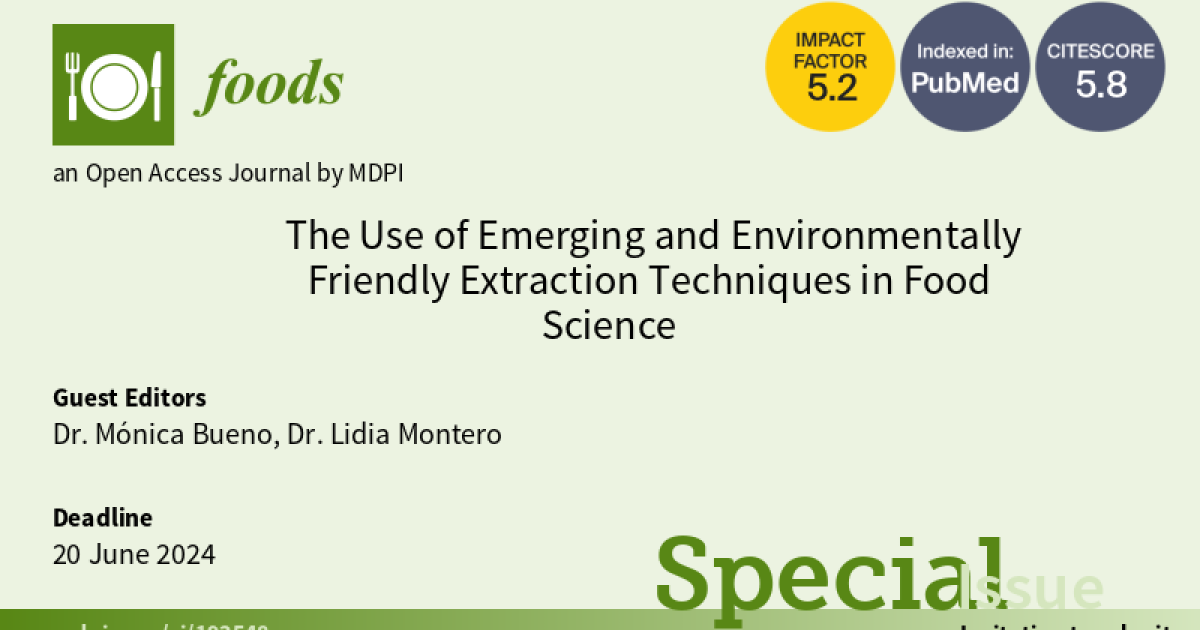- 5.1Impact Factor
- 8.7CiteScore
- 15 daysTime to First Decision
The Use of Emerging and Environmentally Friendly Extraction Techniques in Food Science
This special issue belongs to the section “Food Engineering and Technology“.
Special Issue Information
Dear Colleagues,
Today, there is a collective increasing demand for the sustainable development of more eco-friendly food processes. In this sense, foods and food by-products are continuously evaluated as sources of compounds of interest for several applications in the food, pharma, and cosmetic industries. In this context, the method of extraction is the primary concern for reaching these types of products. For this reason, new emerging technologies such as supercritical fluid extraction, pressurized liquid extraction, ultrasound-assisted extraction, microwave-assisted extraction, and enzyme-assisted extraction, among others, combined with the use of green solvents, specifically deep eutectic solvents and bio-based solvents are hot topic solutions that comply with the principles of green chemistry and circular economy when they are used to valorize food by-products or develop new biorefinery strategies, which contribute to reducing the negative environmental effect of the current food system. Therefore, this Special Issue aims to explore eco-friendly methods for obtaining products with food applications, such as bioactive ingredients, additives to enhance food quality from diverse sources, or the formulation of new food products by the addition/elimination of ingredients applying emergent extraction techniques.
Original research papers and review articles related to, but not limited to, the following topics are welcome: extraction, fractionation and purification, biological activities, complex approaches based on process integration, deep eutectic solvents, biosolvents, intensification, and biorefinery platforms, the valorization of food by-products, pretreatments, enzymatic reactions, scaling up, and economic and environmental impacts.
Dr. Mónica Bueno
Dr. Lidia Montero
Guest Editors
Manuscript Submission Information
Manuscripts should be submitted online at www.mdpi.com by registering and logging in to this website. Once you are registered, click here to go to the submission form. Manuscripts can be submitted until the deadline. All submissions that pass pre-check are peer-reviewed. Accepted papers will be published continuously in the journal (as soon as accepted) and will be listed together on the special issue website. Research articles, review articles as well as short communications are invited. For planned papers, a title and short abstract (about 250 words) can be sent to the Editorial Office for assessment.
Submitted manuscripts should not have been published previously, nor be under consideration for publication elsewhere (except conference proceedings papers). All manuscripts are thoroughly refereed through a single-blind peer-review process. A guide for authors and other relevant information for submission of manuscripts is available on the Instructions for Authors page. Foods is an international peer-reviewed open access semimonthly journal published by MDPI.
Please visit the Instructions for Authors page before submitting a manuscript. The Article Processing Charge (APC) for publication in this open access journal is 2900 CHF (Swiss Francs). Submitted papers should be well formatted and use good English. Authors may use MDPI's English editing service prior to publication or during author revisions.
Keywords
- microwave-assisted extraction (MAE)
- pulsed electric field-assisted extraction
- ultrasound-assisted extraction (UAE)
- enzyme-assisted extraction (EAE)
- compressed fluid technologies (PLE, GXL, SFE)
- green solvents
- deep eutectic solvents
- bio-based solvents
- sustainability
- environmental impact
- food extraction
- bioactive ingredients
- food by-products
- biorefinery

Benefits of Publishing in a Special Issue
- Ease of navigation: Grouping papers by topic helps scholars navigate broad scope journals more efficiently.
- Greater discoverability: Special Issues support the reach and impact of scientific research. Articles in Special Issues are more discoverable and cited more frequently.
- Expansion of research network: Special Issues facilitate connections among authors, fostering scientific collaborations.
- External promotion: Articles in Special Issues are often promoted through the journal's social media, increasing their visibility.
- e-Book format: Special Issues with more than 10 articles can be published as dedicated e-books, ensuring wide and rapid dissemination.

